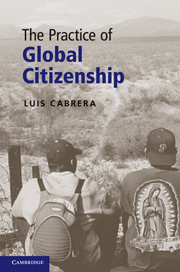Book contents
- Frontmatter
- Contents
- Preface
- Acknowledgments
- Introduction
- Part I Theoretical concerns
- Part II Global citizenship in practice
- Part III Advocacy and institutions
- 7 Regional citizenship and global citizenship
- 8 Advocacy duties and global democracy
- 9 Education and motivation for global citizenship
- Conclusion: the practice of global citizenship
- Appendix
- Works cited
- Index
8 - Advocacy duties and global democracy
Published online by Cambridge University Press: 05 June 2012
- Frontmatter
- Contents
- Preface
- Acknowledgments
- Introduction
- Part I Theoretical concerns
- Part II Global citizenship in practice
- Part III Advocacy and institutions
- 7 Regional citizenship and global citizenship
- 8 Advocacy duties and global democracy
- 9 Education and motivation for global citizenship
- Conclusion: the practice of global citizenship
- Appendix
- Works cited
- Index
Summary
The institutional focus in this chapter is on a formal parliamentary body that could contribute to World Trade Organization governance. The principles and input mechanisms identified, however, would be applicable to any similar body created alongside the United Nations, International Monetary Fund, or other global governance organizations (Archibugi 2008, 172–8; see Young 2000, 271–5; Held 2004, ch. 6; Marchetti 2006, 300). I offer here some reasons why it would be appropriate in a global citizenship frame to empower non-elites within states to give more substantive and routine input into global trade governance. The discussion is informed by recent normative work on trans-state or cosmopolitan democracy, in that it gives some emphasis to ensuring that those who feel the impacts of suprastate policy decisions are able to offer input into policy formation. I do not presume, however, that decision-making sets are appropriately limited according to such impacts. Individuals within states that are excluded from some aspects of global economic integration, and thus do not see significant direct impacts from specific rules formulated in the WTO or other bodies, could still have very powerful reasons for wanting to give input on the formation of policies that could address their exclusion and lessen related deprivations, as discussed in previous chapters. They can plausibly be seen as having advocacy duties to give such input, or to take steps toward their own inclusion in suprastate governance institutions.
The golden goose
The massive protests surrounding the 1999 ministerial meeting of the World Trade Organization in Seattle have been seen by many as a seminal moment in the emergence of a global movement against “corporate-led globalization.” The events, where as many as 50,000 protesters took to the streets to shut down the ministerial opening ceremonies, left a deep impression on then-EU Trade Commissioner Pascal Lamy. One lesson from WTO Seattle, Lamy later told a European Parliament audience, was that the organization should consider ways to improve representation, including proposals to create a WTO parliamentary body. Such a body, even if purely consultative, could provide more avenues of access, and greater legitimacy, to WTO governance (Lamy 2000; see Bender 2002, 206; Mann 2004, 662; Charnovitz 2004; Trachtman 2006; Steger 2009).
- Type
- Chapter
- Information
- The Practice of Global Citizenship , pp. 211 - 237Publisher: Cambridge University PressPrint publication year: 2010

